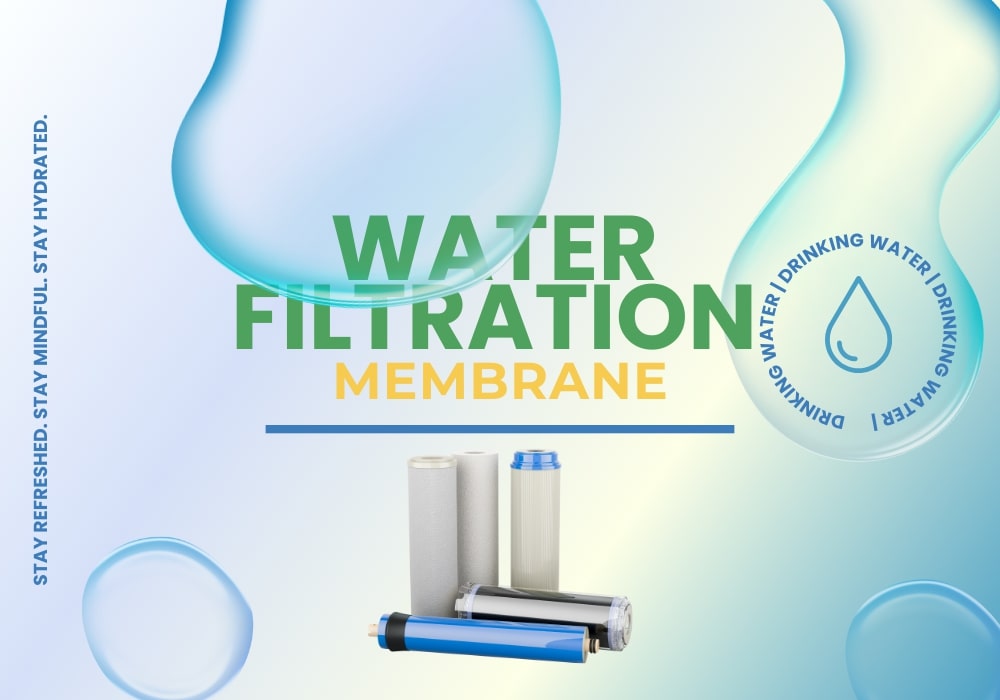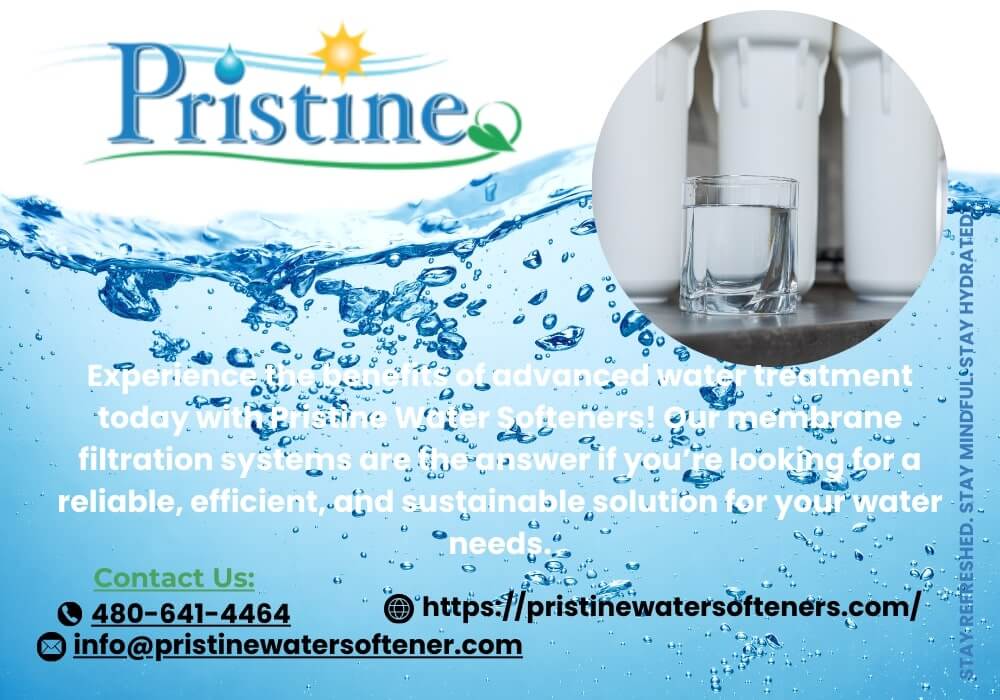Water is a fundamental resource, essential for life, agriculture, industry, and countless other applications. With the increasing demand for clean water, advanced treatment methods have become crucial to ensuring its availability and safety. Among the various technologies available today, membrane filters for water treatment stand out as a highly effective and efficient solution. These filters, through a process known as membrane filtration water treatment, provide numerous advantages over traditional methods. This blog post will explore these advantages in detail, highlighting how modern systems benefit from this innovative technology.
Understanding Membrane Filtration Water Treatment
Before exploring the advantages, it’s essential to understand what membrane filtration water treatment entails. At its core, this method involves using semi-permeable membranes to separate contaminants from water. The membranes act as physical barriers that allow water molecules to pass through while blocking larger particles, microorganisms, and dissolved substances. The process can be further categorized into microfiltration, ultrafiltration, nanofiltration, and reverse osmosis, each varying in the size of particles they can filter.
1. High Efficiency in Contaminant Removal
One of the most significant advantages of using membrane filters for water treatment is their high efficiency in removing a wide range of contaminants. Unlike traditional filtration methods, which might only target specific types of impurities, membrane filtration can effectively remove particles, bacteria, viruses, and even dissolved salts. This comprehensive contaminant removal ensures that the treated water meets stringent quality standards, making it suitable for various applications, including drinking water, industrial processes, and wastewater treatment.
For instance, reverse osmosis, a type of membrane filtration water treatment, can remove up to 99% of dissolved salts, making it ideal for desalination processes. Ultrafiltration and microfiltration are particularly effective in removing bacteria and viruses, which are often challenging to eliminate with conventional methods. This high-efficiency level makes membrane filtration an indispensable tool in modern water treatment systems.
2. Scalability and Flexibility
Another advantage of membrane filters for water treatment is their scalability and flexibility. Modern water treatment systems require solutions that can be easily scaled up or down depending on the demand. Membrane filtration systems can be designed to accommodate small-scale operations, such as residential water treatment units, as well as large-scale industrial and municipal water treatment plants.
The modular nature of membrane filtration systems allows for easy expansion or modification, making it possible to adapt to changing water treatment needs. This flexibility is particularly beneficial for industries that require varying water quality levels for different processes. By adjusting the type of membrane or the filtration system configuration, operators can achieve the desired level of treatment with minimal disruption to the overall system.
3. Energy Efficiency and Cost-Effectiveness
In an era where energy conservation is a priority, membrane filters for water treatment offer a more energy-efficient alternative to traditional methods. Despite requiring high pressure to force water through the membrane, processes like reverse osmosis are still more energy-efficient than methods like thermal distillation. This efficiency translates into lower operational costs, especially for large-scale applications.
Moreover, membrane filtration systems often require less chemical usage than conventional methods. For example, chemical coagulation or disinfection might be necessary in traditional water treatment processes to achieve the same level of contaminant removal that membranes provide naturally. By reducing the reliance on chemicals, membrane filtration not only lowers operational costs but also minimizes the environmental impact of water treatment operations.
4. Compact Design and Space Efficiency
Another significant advantage of membrane filtration water treatment systems is their compact design, particularly in urban and industrial settings where space is at a premium. Unlike conventional water treatment plants that require large settling tanks and extensive infrastructure, membrane filtration systems are often much smaller and more compact. This reduced footprint allows for installing water treatment facilities in locations where space constraints would otherwise be a limiting factor.
This space efficiency is particularly valuable in industrial applications, where water treatment systems often must be integrated into existing facilities. The ability to install a high-capacity water treatment system without requiring extensive space makes membrane filtration an attractive option for industries looking to optimize their operations.
5. Consistent and Reliable Water Quality
Consistency in water quality is critical, especially for applications that require water to meet specific standards. Membrane filters for water treatment provide reliability often unmatched by other methods. The physical barrier created by the membrane ensures that only water molecules pass through, consistently producing high-quality water regardless of variations in the raw water source.
This reliability is essential in regions where the quality of the water supply may fluctuate due to seasonal changes, pollution, or other factors. With membrane filtration water treatment, operators can have confidence that the treated water will consistently meet the required standards, reducing the risk of operational disruptions or additional treatment.
6. Minimal Chemical Usage and Environmental Impact
Traditional water treatment methods often rely on significant amounts of chemicals to achieve desired water quality levels. Coagulation, flocculation, and chlorination are common processes that, while effective, can introduce chemical residues into the treated water and the environment. Membrane filters for water treatment significantly reduce the need for these chemicals, as the physical separation process inherently removes contaminants without requiring chemical additives.
This reduction in chemical usage not only lowers operational costs but also minimizes the environmental impact of water treatment processes. The production, transportation, and disposal of chemicals used in traditional water treatment all contribute to a facility’s environmental footprint. By adopting membrane filtration water treatment, facilities can achieve water quality goals while aligning with sustainability objectives.
7. Versatility in Application
Membrane filters for water treatment are highly versatile and suitable for various applications. Whether treating drinking water, processing wastewater, or purifying water for industrial use, membrane filtration can be tailored to meet specific requirements. Different types of membranes can be selected based on the type of contaminants present and the desired purity level.
For example, in the food and beverage industry, ultrafiltration membranes often remove bacteria and other microorganisms while allowing essential nutrients to remain in the water. In pharmaceutical manufacturing, reverse osmosis membranes produce high-purity water free from dissolved ions and organic compounds. This versatility makes membrane filtration a preferred choice across various industries.
8. Long-Term Durability and Low Maintenance
Another key advantage of membrane filters for water treatment is their durability. Modern membranes are designed to withstand continuous operation rigors while maintaining filtration efficiency. Advances in membrane materials and manufacturing techniques have resulted in products that are resistant to fouling, scaling, and chemical degradation, extending the lifespan of the membranes and reducing the frequency of replacements.
Additionally, membrane filtration systems typically require less maintenance than traditional treatment methods. Automated cleaning processes, such as backwashing and chemical cleaning, can be integrated into the system to maintain membrane performance without frequent manual intervention. This low maintenance requirement reduces operational downtime and lowers overall maintenance costs.
9. Enhanced Safety and Public Health
Public health and safety are paramount in water treatment, and membrane filtration water treatment offers a high level of protection against waterborne pathogens and contaminants. By physically blocking bacteria, viruses, and other harmful organisms, membrane filtration reduces the risk of waterborne diseases. This is particularly important in drinking water treatment, where the safety of the water supply directly impacts public health.
Furthermore, membrane filtration’s ability to remove chemical contaminants, such as pesticides and pharmaceuticals, provides an added layer of protection against potential health hazards. As concerns about emerging contaminants continue to grow, the role of membrane filtration in safeguarding public health becomes increasingly important.
10. Compliance with Regulatory Standards
Meeting regulatory standards is a critical aspect of water treatment, and membrane filters are highly effective in ensuring compliance. Regulatory agencies worldwide have established stringent guidelines for water quality, particularly for drinking water and wastewater discharge. Membrane filtration systems are designed to meet or exceed these standards, giving operators confidence that their water treatment processes fully comply with regulatory requirements.
The precision and reliability of membrane filtration water treatment make it easier for facilities to achieve consistent results, even as regulations become more stringent. This ability to maintain compliance without requiring frequent adjustments or additional treatment steps is a significant advantage for water treatment operators.
11. Adaptability to Emerging Contaminants
As new contaminants continue to be identified in water supplies, the adaptability of membrane filters for water treatment becomes increasingly valuable. Emerging contaminants, such as microplastics, pharmaceuticals, and personal care products, pose new challenges for water treatment facilities. Traditional methods may not effectively remove these contaminants, but membrane filtration offers a solution.
The fine pore size of membranes allows for the removal of even the smallest particles and dissolved substances, making it possible to address emerging contaminants effectively. As research and development in membrane technology continue, new membranes with enhanced capabilities are being developed, further improving the ability to tackle the challenges posed by emerging contaminants.
12. Contribution to Sustainable Water Management
Sustainable water management is a global priority; membrane filtration water treatment is crucial in achieving this goal. Membrane filtration supports sustainability principles by providing an energy-efficient, low-chemical, and highly effective water treatment solution. This technology enables water reuse in industrial processes, reduces the demand for freshwater resources, and minimizes the environmental impact of water treatment operations.
In areas facing water scarcity, membrane filtration can be used for desalination, providing a reliable source of freshwater from seawater. This capability is essential for regions with limited or overexploited traditional water sources. By contributing to the sustainable management of water resources, membrane filters for water treatment help ensure that future generations have access to clean and safe water.
13. Innovation and Ongoing Development
The field of membrane filtration water treatment is characterized by continuous innovation and development. Advances in membrane materials, such as nanotechnology, have led to the creation of membranes with improved performance and durability. Research also focuses on developing membranes that can resist fouling, reduce energy consumption, and remove a broader range of contaminants.
These ongoing developments ensure that membrane filtration remains at the forefront of water treatment technology. As new challenges and demands emerge, membrane filtration’s adaptability and innovation will continue to provide effective solutions for modern water treatment systems.
Transform Your Water Quality with Pristine Water Softeners!
Experience the benefits of advanced water treatment today with Pristine Water Softeners! Our membrane filtration systems are the answer if you want a reliable, efficient, and sustainable solution for your water needs. With unparalleled efficiency in contaminant removal, scalability to fit any operation, and a commitment to environmental sustainability, Pristine Water Softeners ensures your water is as pure as nature intended. Don’t settle for less—upgrade to cutting-edge technology and safeguard your water quality. Contact us now to learn more about our innovative water treatment solutions tailored just for you!



